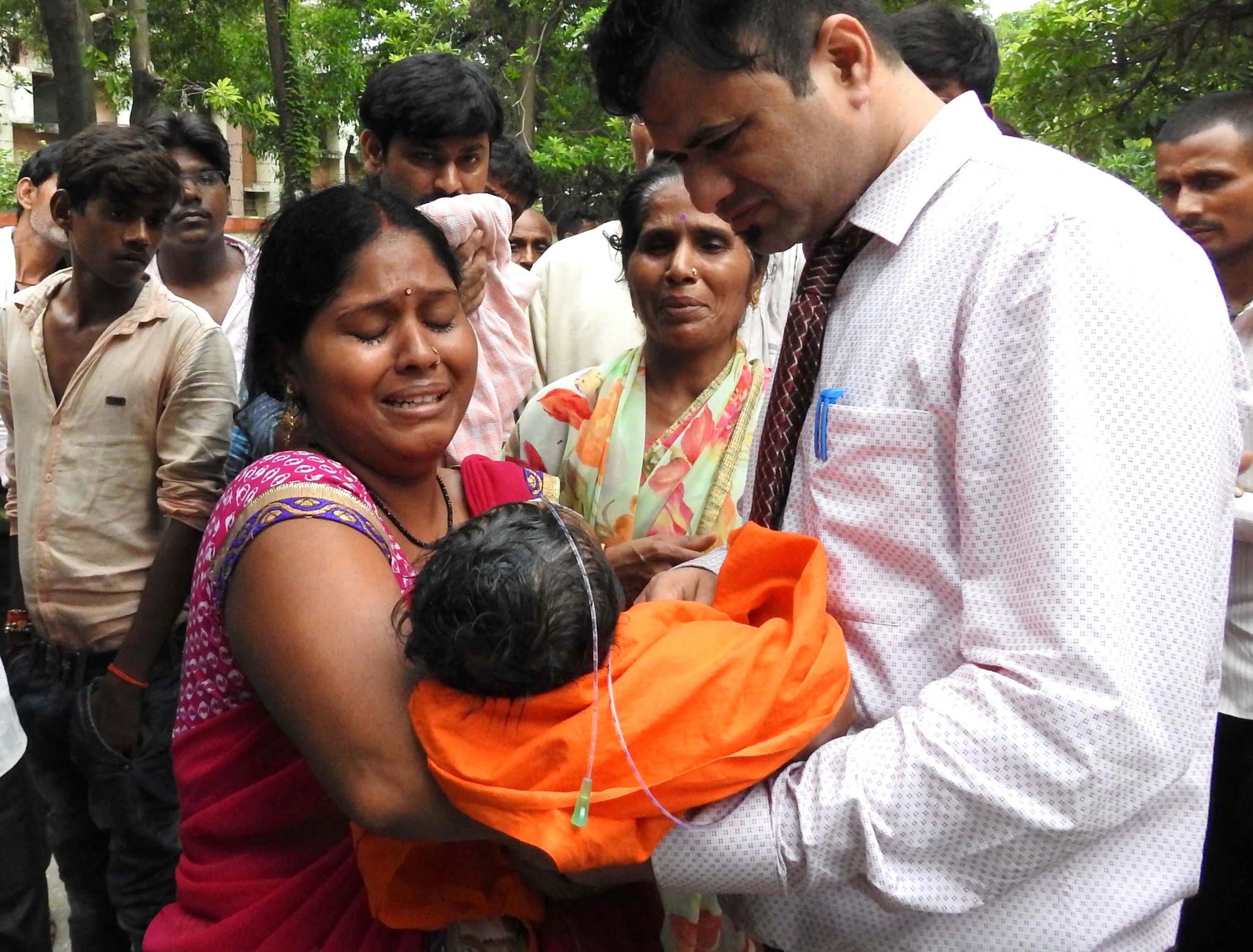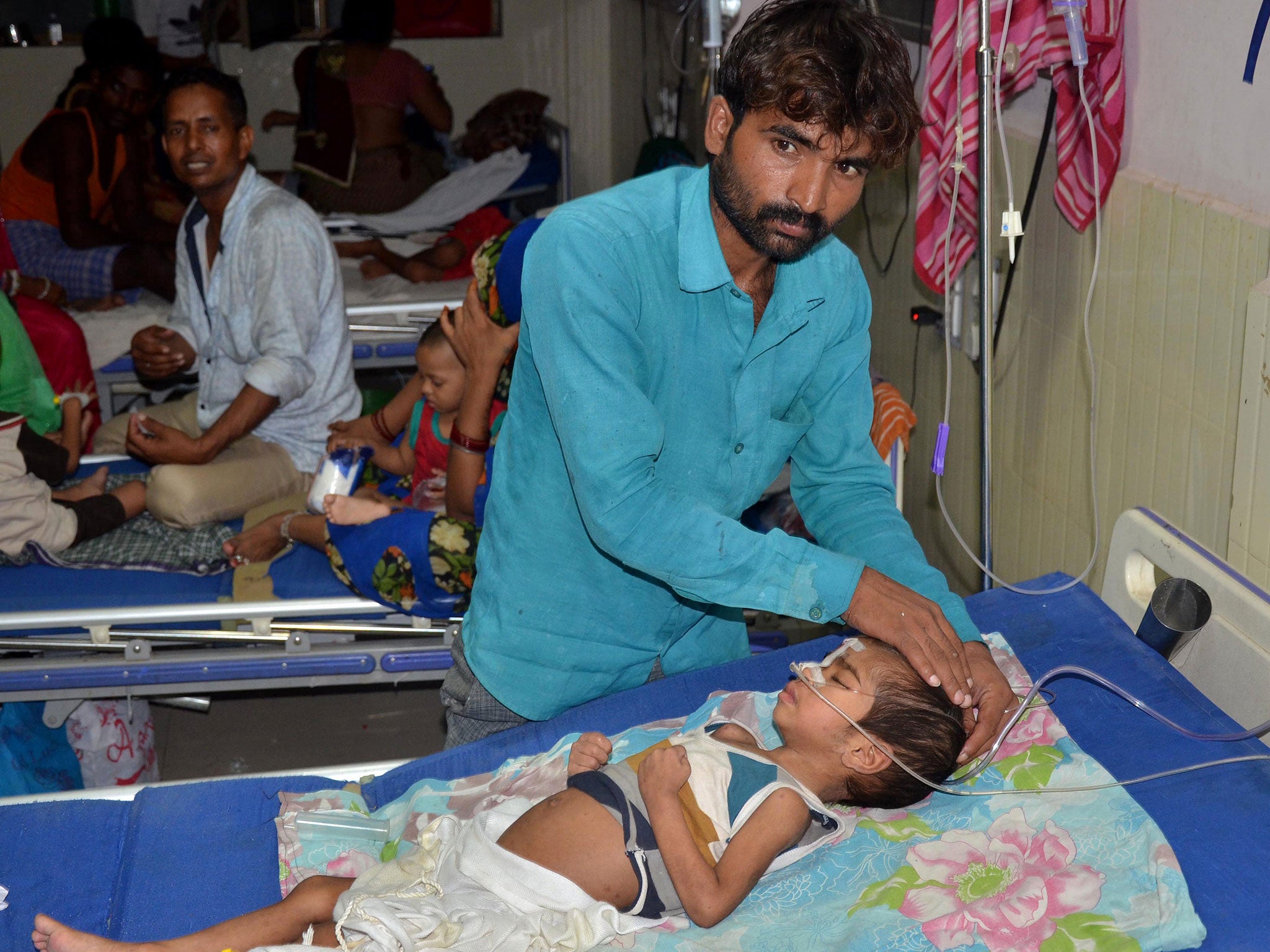Indian doctor who spent 500 days in jail over children’s deaths fights against dismissal
Kafeel Khan, a paediatrician from Uttar Pradesh who has been in and out of jail for four years, tells Sravasti Dasgupta the government is trying to make him the scapegoat of a major national tragedy

On the night of 10 August 2017, Kafeel Khan, a paediatrician in the northern Indian state of Uttar Pradesh (UP), was playing with his then 11-month-old daughter when he received a message on a WhatsApp group that liquid oxygen had run out at his hospital.
Over the course of the next two days, horror unfolded at the Baba Raghav Das Medical College and Hospital in Gorakhpur city as 63 children in the Acute Encephalitis Syndrome (AES) ward died due to an alleged lack of oxygen.
Some reports said the hospital ran out of stock that day after the supplier cut off oxygen due to unpaid bills. But the state government that ran the hospital has denied the deaths were due to a lack of oxygen, and claimed all bills were paid on time.
The deaths became a political flashpoint at the time, and had led to nationwide outrage and calls for accountability.
In the last four years, Dr Khan, who was initially hailed for arranging oxygen cylinders and saving many lives, has been in and out of jail on criminal charges connected to the tragedy. He was finally sacked from his job with the hospital last November, even though both investigative journalism reports and the court system have absolved him of charges.
The 39-year-old doctor tells The Independent that he has spent “more than 500 days in jail in five years of the Yogi Adityanath government” in Uttar Pradesh – a reference to the chief minister of the state, Adityanath, whose Hindu nationalist BJP is fighting for re-election in state polls that began on Thursday.
Khan believes that his detention was a direct consequence of “speaking out” against the BJP administration. “The real culprits were the government officials and to save them I was made a scapegoat,” he said.
Last month, on the eve of the closely-watched state election in UP, Khan released a book detailing the events of those two fateful nights in 2017. The Gorakhpur Hospital Tragedy: Memoir of a Deadly Medical Crisis is an attempt to “seek justice for the families” who lost their children, the doctor said.
The book has led to speculation that Khan, who has emerged as a vocal critic of the Adityanath government in the past few years, may soon enter politics, rumours fuelled by the support he enjoys from opposition parties such as the Indian National Congress.
On 25 January, Khan said that he would be willing to take on Adityanath in Gorakhpur if a political party gives him a ticket, according to the Press Trust of India.
In an interview with The Independent, the paediatrician says that he feels joining politics may be the only way to fix a broken system. “But my motto remains that I need to work to ensure free healthcare for all. So I am focusing on that,” he says.

On 13 August 2017, two days after the tragedy, Khan was removed from his post. He was suspended on 22 August. In September that year, he was arrested on a range of charges including medical negligence, corruption and dereliction of duty.
He was released on bail only in April 2018 after the Allahabad High Court intervened.
The high court had said at the time that there was “no material on record, which may establish medical negligence against [Khan]” individually in connection with the death of infants at the Gorakhpur hospital. It also noted that he was not a part of the tendering process that resulted in the enlistment of the entity that was charged with the supply of medical oxygen.
The doctor’s run-ins with the law did not stop there, however. In September 2018, it was reported that 76 children died in two months in a hospital in UP’s Bahraich district “due to what the government said was a mysterious disease”, Khan says. “When I went there with a fact finding team, I found that the children had died due to AES and the government did not want to announce that, as they wanted to project that encephalitis cases were decreasing in UP,” he says.
Later that month, the police in Bahraich jailed Khan for creating a nuisance at the hospital.
AES, or Acute Encephalitis Syndrome, is the term used for Japanese Encephalitis by the Indian government. The disease primarily affects children in the 1-5 years age group, and is endemic in various parts of UP, particularly in the eastern region, where Gorakhpur is situated.
While Khan was released on bail by a court a day after this arrest, the UP government suspended him again in 2019 in connection with the incident.
A few months later, in January 2020, he was back in jail in connection with a speech he had delivered the previous month on India’s controversial Citizenship Amendment Act. The government slapped him with charges under the stringent National Security Act (NSA) for “disturbing public order in the city and creating an atmosphere of fear and insecurity within the citizens of Aligarh”.
The charges were quashed in September 2020 after the Allahabad High Court granted Khan bail and said that his speech did not invoke hate or violence. The UP government challenged this in the Supreme Court but lost its appeal that December.
Finally, the government dismissed him from service in November. Alok Kumar, the principal secretary in Uttar Pradesh’s department of medical education, told reporters that Khan was being sacked in relation to a probe on the 2017 deaths. The termination came just months after the UP government told the high court that it had withdrawn an order for a second departmental inquiry against him.
The termination letter found him guilty of conducting private practice while employed with the government and accused him of not having the requisite medical licence.
It also held him responsible for the 2017 deaths but said the charge of medical negligence does not stand against him, as noted by an inquiry panel instituted by the state government to probe the child deaths. The panel had in 2019 submitted a report absolving the doctor of all charges and even praised his “honest efforts”.
The doctor has challenged his termination in the Allahabad high court, which at a hearing last week sought a response from the state administration.
Khans says that “even the termination order says there is no medical negligence done by Dr Kafeel, no evidence of corruption.” In fact, it noted that he was “the junior most doctor and on leave that night but still went at 1.12am and saved so many lives”, he says. “Yet I have been terminated.”
“If court, inquiry commission, all say that Dr Kafeel is not a murderer, then who killed these kids and who is answerable?” Khan asked. “Nine people were incarcerated, including me, after the BRD hospital tragedy. Eight of them decided to keep quiet while I was the only one raising questions.”
While Khan was sacked, the hospital officials arrested with him have since been reinstated, including the principal who has since retired, reported legal website Article-14.

UP government officials, however, denied that Khan was being targeted. “All due process was followed and opportunity of defence was given to him,” said Kumar. “On merit, his defence was weak and inadequate and on the basis of that, charges were found to be serious enough to warrant a dismissal.
“Moreover, if he is still aggrieved he has several options available to appeal against his dismissal, including approaching the governor or the public services tribunal,” he added. “Instead of doing this, he is giving interviews to the media which is in violation of government service conduct rules.”
Khan, meanwhile, says his fight for the 2017 victims continues, even though he fears he will continue to be targeted. “I may face further action, my family is scared for my safety. But somebody has to speak the truth, everybody cannot be mute spectators,” he says.
“I can still hear the cries of agony that were ringing out of the hospital on the night of 10 August 2017,” the doctor adds. “It was like a war-zone.”
“I still remember a three-year-old girl, Bhumika, from that night. When we tried to resuscitate her with Ambu bag [a hand-held tool to provide ventilation to patients struggling to breathe], she started frothing from the mouth and, ultimately, we lost her.”
He adds: “Along with her parents, I also cried that day.”






Join our commenting forum
Join thought-provoking conversations, follow other Independent readers and see their replies
Comments